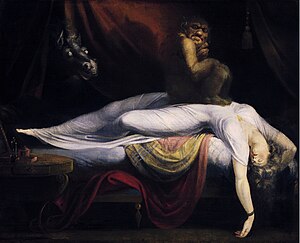Phi Am
| Sleep paralysis | |
|---|---|
 |
|
| The Nightmare by Henry Fuseli (1781) is thought to be a depiction of sleep paralysis perceived as a demonic visitation. | |
| Specialty | Sleep medicine |
| Symptoms | Awareness but inability to move during waking or falling asleep |
| Duration | Less than a couple of minutes |
| Risk factors | Narcolepsy, obstructive sleep apnea, alcohol use, sleep deprivation |
| Diagnostic method | Based on description |
| Similar conditions | Narcolepsy, atonic seizure, hypokalemic periodic paralysis, night terrors |
| Treatment | Reassurance, sleep hygiene, cognitive behavioral therapy, antidepressants |
| Frequency | 8–50% |
| Classification |
|---|
Sleep paralysis is when, during awakening or falling asleep, one is aware but unable to move. During an episode, one may hear, feel, or see things that are not there. It often results in fear. Episodes generally last less than a couple of minutes. It may occur as a single episode or be recurrent.
The condition may occur in those who are otherwise healthy, those with narcolepsy, or may run in families as a result of specific genetic changes. The condition can be triggered by sleep deprivation, psychological stress, or abnormal sleep cycles. The underlying mechanism is believed to involve a dysfunction in REM sleep. Diagnosis is based on a person's description. Other conditions that can present similarly include narcolepsy, atonic seizure, and hypokalemic periodic paralysis.
Treatment options for sleep paralysis have been poorly studied. People should generally be reassured that the condition is common and not serious. Other efforts that may be tried include sleep hygiene, cognitive behavioral therapy, and antidepressants.
Between 8% and 50% of people experience sleep paralysis at some time. About 5% of people have regular episodes. Males and females are affected equally. Sleep paralysis has been described throughout history. It is believed to have played a role in the creation of stories about alien abduction and other paranormal events.
The central symptoms of sleep paralysis is during awakening being aware but being unable to move.
Humming, hissing, static, zapping and buzzing noises are reported during sleep paralysis. Imagined sounds (voices, whispers and roars) are also experienced. These symptoms are usually accompanied by intense emotions: such as fear, and panic. People also have sensations of being dragged out of bed or of flying, and feelings of electric tingles or vibrations running through their body.
...
Wikipedia
